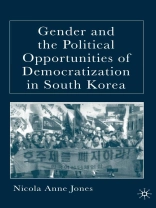This book explores how political opportunities afforded by democratization, including the relative balance of power between conservative and progressive civic actors, shape power relations between men and women in post-authoritarian Korea. Jones reveals that organized women can make a difference – depending on their strategic choices and alliances, and the manner in which they negotiate evolving political institutions. Moreover, democratic consolidation need not be led by political parties, but can provide surprising opportunities for an organized civil society to press for a deepening of political and human rights.
Jadual kandungan
Modelling the Gendered Political Opportunity Structures of Democratization Setting the Stage: Historical Constraints and Democratization Dynamics The Korean Women’s Movement: From Minjung Feminism to Gender Mainstreaming Competing ‘Gender Coalitions’: Progressive Allies, Fragmented Opponents and Contradictory State Interests The Political Institutional Matrix Identifying Access and Veto Opportunities Policy Change: Differing Logics of Political Contestation State Transformation: Creating a Women’s Policy Machinery Infrastructure Women’s Political Representation: Accounting for Gradualism Conclusions: Assessing Cultural Change and Theoretical Lessons
Mengenai Pengarang
NICOLA ANNE JONES is the International Co-odinator of the research study
Young Lives: An International Study of Childhood Poverty.












